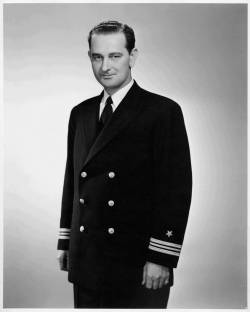Timeline: LBJ and the Nation
1908-1919 1920-1929 1929-1940 1941-1945 1946-1953 1954-1960 1960-1963 1963-1969 1969-1973
1941-1945
The U.S. was unprepared for war. As it awakened to the danger from abroad, the Army was obliged to train with dummy weapons and trucks took the place of tanks. For forty-four months—from the Japanese attack on Pearl Harbor on December 7, 1941, to the atomic explosions over Hiroshima and Nagasaki in August 1945—more than sixteen million American men and women were in uniform. On every continent, in the air, on seas, in beaches and jungles and snow, all branches of the services fought to bring an end to the Axis powers of Germany, Italy, and Japan. Vice President Harry S. Truman assumed national leadership on the sudden death of President Roosevelt on April 12, 1945.
An officer in the U.S. Naval Reserve, Johnson was the first member of Congress to enter the armed services after Pearl Harbor.
Lady Bird Johnson ran the congressional office while Johnson was in the service.
Events
- The American home front during the war was a place of lonely vigil and quiet patriotism. Blue star flags hung in millions of windows, representing someone in service. Gold star flags told a grimmer story: a family member killed in action.
- "Rosie the Riveter" became a synonym for the millions of women who filled the factories and production lines, turning out the weapons and tools that shifted the economy and assured victory on the battlefield.
Lyndon Baines Johnson
Johnson made a run for the Senate in a special election in 1941 and his personal contact with the voters, along with his serious message, appeared to overtake his opponent. But after the polls closed, enough uncounted votes were "discovered" to give the victory to his rival.
It was the only defeat Johnson suffered at the polls in his political career and he later described it as the "most miserable period" in his life.
An officer in the U.S. Naval Reserve, Johnson was the first member of Congress to enter the armed services after Pearl Harbor. He was assigned to investigate production bottlenecks on the West Coast and witness the military problems facing U.S. forces in the Pacific.
Lyndon Johnson received the Silver Star from General Douglas MacArthur and although he was proud of the award, Johnson wrote that his "brief service" made him "sensitive" about accepting the citation. He left the navy when Roosevelt ordered all members of Congress to return to their elected posts.
Lady Bird Johnson
Lady Bird ran the congressional office while Johnson was in the service, although he continued to exert his influence. Defining herself "as a kind of liaison," she regularly reported office activities to Johnson via typed letters, which he returned with penned comments and instructions.

